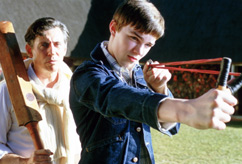| Wah-Wah |
| |
 |
UK/France/South Africa, 2005. Rated R. 120 minutes.
Cast:
Gabriel Byrne, Emily Watson, Nicholas Hoult, Julie Walters, Miranda Richardson, Celia Imrie, Julian Wadham, Fenella Woolgar, Sid Mitchell, Zachary Fox
Writer: Richard E. Grant
Original Music: Patrick Doyle
Cinematography: Pierre Aïm
Producers: Marie-Castille Mention-Schaar, Pierre Kubel, Jeff Abberley
Director: Richard E. Grant
LINKS
|
 o describe his reaction to L.A. Story , Richard E. Grant wrote, “If only I could have liked this movie as much as I liked them.” He was talking about his friends and co-stars, writer/producer Steve Martin and Victoria Tennant. That's how I feel about this film. If only I could have liked this movie as much as I like its writer and director, Richard E. Grant.
o describe his reaction to L.A. Story , Richard E. Grant wrote, “If only I could have liked this movie as much as I liked them.” He was talking about his friends and co-stars, writer/producer Steve Martin and Victoria Tennant. That's how I feel about this film. If only I could have liked this movie as much as I like its writer and director, Richard E. Grant.
That may beg a question. Who is Richard E. Grant? U.S. film credits don't seem impressive—third billed in the aforementioned L.A. Story (1991), Anais Nin's cuckolded husband in Henry and June (1990), one of Lucy's suitors in Bram Stoker's Dracula (1992), and a very bad guy in the very bad Hudson Hawk (1991). In Britain, however, Grant's breakout performance as a flamboyant, acid-tongued drug abuser named Withnail in Bruce Robinson's cult comedy Withnail and I (1985) is legendary. Grant has worked steadily in film and television ever since. Grant has maintained his sardonic, catty voice in numerous roles, as well as in his hilarious film diaries, the aptly named With Nails.

Gabriel Byrne (left) and Nicholas Hoult star in Richard E. Grant's Wah-Wah. |
Wah-Wah, Grant's semi-autobiographical directorial debut is a disappointment partly because Grant's claws remain retracted. There's a bit of predictable satire directed at pompous Brit twits abroad, but none of it cuts deep. Apart from that, the film is far too earnest, even overwrought at times.
Wah-Wah is the first feature ever made in Swaziland, where Grant grew up. It's a coming-of-age story in the context of a disintegrating British colonial family during the Swazi run-up to independence in the late Sixties—Grant's own background. The film opens with a surprising scene. In a stopped car, eleven-year-old Ralph (Zachary Fox) is awakened by his mother (Miranda Richardson) having sex in the front seat with his father's best friend. Though improbable, Grant swears this actually happened.
Faced with the loss of his wife and the impending loss of his post as the Minister of Education, Ralph's father (Gabriel Byrne) turns to alcohol and to an American “ex-air hostess” named Ruby (Emily Watson), whom he marries six weeks after meeting her. Now fourteen and played by About a Boy's Nicholas Hoult, Ralph forges a bond with Ruby, and pines for a local girl, and copes with a nervous tic, and makes puppets, and joins rehearsals for a musical production of Camelot to commemorate a visit by Princess Margaret, and blah, blah, blah. Or wah-wah-wah, as Ruby prefers to say. Thus the title. Had Larry David made this movie, he might have called it Yadda Yadda instead.
Though a fine and unconventional actor, if Grant has one weakness, it's the same as his strength—his tendency to overstate. This has suited him well in satires like Withnail and I, How to Get Ahead in Advertising, and even in a more subtle piece like Gosford Park, but it doesn't always translate to straightforward drama. Grant appears to have the same weakness as a writer/director, for Wah-Wah lacks nuance. While there are complex characters (particularly the father), there's little subtlety about where each scene is going and what it's designed to do. Sprinkle in a couple bland musical montages, and Wah-Wah becomes too obvious for a small coming-of-age story. At the same time, the film remains superficial. The characters' difficult emotions and self-destructive compulsions have tremendous potential for conflict, but Grant never translates them into narrative momentum. The film just coasts along.
All this means boredom. While some adults will no doubt be grateful for a film like Wah-Wah amid the wasteland of summer-movie explosions, it still amounts to an assortment of mild clichés and straightforward, on-the-nose writing. (Would a child pray for his mother “to fix our broken family”?) Wah-Wah is the sort of film that's obviously deeply meaningful to the filmmaker, but he fails to make it particularly meaningful to you. And that's a painful thing for me to write. Here's hoping Grant tries writing and directing again, and finds the strong voice that his fans expect him to have.
[Read the AboutFilm profile & interview with Richard E. Grant]
Review
© May 2006 by AboutFilm.Com and the author.
Images © 2005 Samuel Goldwyn Films. All Rights Reserved.


